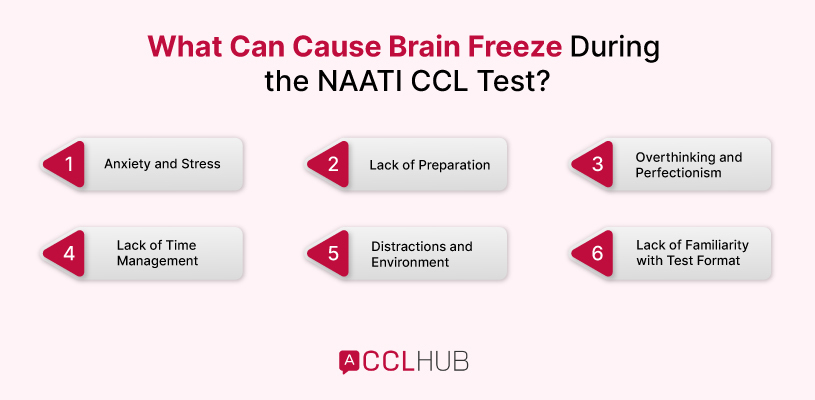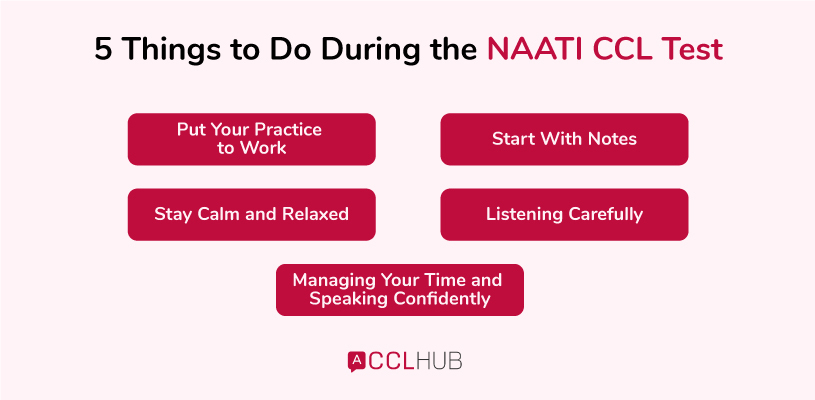
How to Avoid Brain Freeze During the NAATI CCL Test?
Brain freeze can occur at any point during any examination, which many of us have already experienced. Similarly, during a NAATI CCL test, you may go through many dreaded thoughts such as – what if you fail, or what will happen to my Australian Permanent Residency? To eradicate any confusion, in this blog, we have some tips on how to avoid brain freeze during the NAATI CCL test.
Sometimes, even when you prepare well for an exam, and all the information seems to be in your mind, everything you have learned suddenly evaporates during the test. Occasionally, we recover quickly; however, other times, we start losing and cannot perform well in the exam.
This is called a “brain freeze” or “exam freeze.” Let’s learn about what we can do in advance to help reduce the chances of brain freeze during the NAATI CCL test.
Let’s get started!
💡Learn more: NAATI CCL Test Facts You Need to Know.
Short Reminder for NAATI CCL Test Requirements
Before you take the NAATI CCL test, it’s important to know what’s required.
The test focuses on your language abilities, so you must be good at speaking and understanding two languages: your native language and English. This is because the test checks how well you can communicate in both languages.
Also, not all languages are part of this test; they pick languages needed in Australian communities. If your native language is one of those chosen, you can take the test.
You must show identification documents to confirm your identity to sign up for the NAATI CCL test.
Additionally, it’s crucial to understand how the test is structured. The test includes two conversations, one in English and one in your native language.
Your task is to interpret these conversations accurately. It’s like learning the rules of a game before you play it. This knowledge is essential for preparing well and succeeding in the test.
So, knowing these requirements will help you effectively prepare for the NAATI CCL test and earn that five Australian PR points.
What Can Cause Brain Freeze During the NAATI CCL Test?

Most unexplained blackouts are caused by syncope. Many people, including doctors, assume that blackouts during a test are due to epileptic seizures.
In the examination hall, you get anxious because of the new place once you enter a somewhat unpredictable and high-stakes test situation. Hence, brain freeze during the NAATI CCL test is a common phenomenon that can significantly affect test-takers performance and confidence, and you must compulsorily learn how to avoid brain freeze during the NAATI CCL test.
The following are some reasons you might get brain freeze during the NAATI CCL test.
1. Anxiety and Stress
One major cause of brain freeze is the anxiety and stress associated with high-stakes exams like the NAATI CCL test. When you’re nervous, your body’s “fight or flight” response kicks in.
Anxiety and stress are common experiences that many people encounter, especially in situations like the NAATI CCL test.
Firstly, let’s talk about anxiety. It’s like a jittery feeling in your stomach, a sense of nervousness that can affect your performance.
When you’re anxious during the test, it’s like having a cloud over your thoughts, making concentrating a bit harder. Managing anxiety involves finding techniques to calm your nerves, like taking deep breaths or focusing on positive affirmations.
The tricky part is that anxiety and stress often go hand in hand. One can feed into the other, creating a tough cycle to break. It’s crucial to break this cycle by implementing coping mechanisms.
Hence, techniques like mindfulness, time management, and positive visualization can be your tools to navigate through anxiety and stress during the test.
2. Lack of Preparation
Another reason for brain freeze is inadequate preparation. If you haven’t sufficiently studied and practiced the test materials, your brain might struggle to recall the necessary information during the test.
Moreover, the lack of preparation can lead to a mental block during the test. To overcome this, establish a study routine, use mock tests, and focus on strengthening your language skills.
Think of it as building a foundation – the stronger it is, the more confident you’ll be during the test. Also, adequate preparation enhances your language proficiency and helps you manage time effectively during the test.
Lastly, dedicate enough time to learning about the eligibility criteria and review your notes consistently.
3. Overthinking and Perfectionism
Sometimes, test-takers tend to overthink questions and strive for perfection in their answers. Furthermore, this can lead to mental blocks as you might get stuck trying to find the perfect word or phrase.
Not to mention, overthinking and perfectionism often go hand in hand. When you’re aiming for perfection, you may find yourself overanalyzing every step.
Breaking free from this cycle involves acknowledging that perfection is not the ultimate goal. It’s more about showcasing your language skills effectively.
Remember that the NAATI CCL test is about effective communication, not perfection. Making minor mistakes is okay; focus on conveying your message clearly and confidently.
4. Lack of Time Management
Poor time management can also contribute to brain freeze. Spending too much time on one question and then realizing you have limited time left can create panic and hinder your performance on subsequent questions.
Develop a strategy to manage your time wisely during the test, allocating a specific amount of time to each task.
Without proper management, it’s easy to find yourself running out of time before addressing all the questions. Effective time management involves allocating a specific amount of time to each question, ensuring you cover the entire test comprehensively.
Additionally, the lack of time management can result in hasty decisions. When the clock is ticking, there’s a temptation to rush through questions without giving them the attention they deserve.
Hence, It’s crucial to strike a balance between efficiency and accuracy. This familiarity with the test conditions, NAATI CCL marking criteria, types of dialogues, and time constraints can boost your confidence significantly
5. Distractions and Environment
The testing environment plays a crucial role in your performance. If there are distractions in the room, such as noise or discomfort, it can make it challenging to concentrate on the test.
These distractions can divert your focus, whether it’s noise in the test center or external thoughts. Picture it as trying to follow a conversation in a crowded room—it’s hard to hear and process the information.
To manage distractions, cultivate a mindset of selective attention. Train yourself to filter out the noise and hone in on the task in front of you.
Now, think about the test environment. The surroundings play a significant role in your ability to perform well. Find ways to create a comfortable and quiet space during your preparation.
Moreover, the challenge lies in maintaining focus despite external disruptions. Develop strategies to stay centered. By doing so, you can create a mental shield that allows you to navigate the test more efficiently.
Remember, a quiet, focused environment can significantly improve a smoother test experience.
6. Lack of Familiarity with Test Format
Sometimes, test-takers may experience brain freeze because they are unfamiliar with the NAATI CCL test format. Each test has its own structure and requirements, which can be overwhelming if you’re not accustomed to it.
You might find yourself taking detours or getting lost. It’s crucial to acquaint yourself with the test structure, including the types of questions and the time constraints for each section.
Furthermore, a lack of familiarity with the test format can lead to a slower pace and difficulty of the NAATI CCL test chimes in. Hence, practice mock tests to simulate the actual exam conditions and get comfortable with the format.
By understanding the format, you can also develop a strategic approach, allocating your time wisely and prioritizing questions effectively.
7. Pressure to Perform Well
Feeling pressure to do well in the NAATI CCL test is quite common. When there’s a lot riding on the results, like gaining those valuable Australian PR points or unlocking new career opportunities, it’s natural to feel a bit stressed.
This pressure can stem from the desire to succeed and achieve your goals, but it’s essential to manage it effectively.
To overcome this, it’s crucial to approach the test with a positive mindset, viewing it as an opportunity to showcase your language skills.
Additionally, the pressure to perform well can affect your confidence. When the stakes are high, doubts about your abilities may arise. It’s essential to recognize these moments of self-doubt and address them positively.
8. Overthinking
Overthinking refers to the habit of dwelling too much on a thought or a situation, often to the point of creating unnecessary stress or confusion. It’s like having too many tabs open in your mind, making it challenging to focus on the task at hand.
When faced with a question during the NAATI CCL test, instead of trusting your instincts and knowledge, you might find yourself dissecting every aspect of the question, which can lead to indecision and anxiety.
Similarly, one consequence of overthinking is that it can hinder your ability to respond promptly. The test is time-bound, and spending too much time dissecting a single question can compromise your performance on subsequent ones.
To overcome overthinking, try to stay present in the moment. Focus on the information given, trust your preparation, and avoid second-guessing yourself excessively.
By doing so, you can navigate the test more effectively and minimize the impact of overthinking on your performance.
5 Things to Do During the NAATI CCL Test

If you have done everything you can to prepare for the exam, but you still may have nervousness or want to avoid brain freeze during NAATI CCL Test, the following are some tips to help you move forward with confidence to excel in the NAATI CCL exam:
1. Put Your Practice to Work
Get your mindfulness training to work now – take a few minutes before the test to calm yourself. Mindfulness revolves around staying fully engaged in the present moment.
When faced with questions during the test, draw upon the scenarios and examples you encountered in your practice.
This helps in swiftly identifying the context and providing accurate responses. For instance, if you’ve practiced dialogues in specific scenarios, applying similar structures in the test becomes more intuitive.
Furthermore, consider the timing aspect. During practice, you likely worked on managing your time effectively. This ensures that you cover all questions within the stipulated timeframe.
Also, leverage the note-taking skills you practiced. Treat your notes as a valuable aid during the test. Effective note usage can contribute to a more organized and coherent set of answers.
✅ Check Out: Crack the NAATI CCL Online Test in 30 Days.
2. Start With Notes
If you feel that your mind is frozen, start with effective note-taking of the dialogues. This is very good practice for students.
Moreover, you should also familiarize yourself with the assessment criteria of the NAATI CCL test to understand how your performance will be assessed.
Once you’ve grasped the context, use your notes to jot down key terms or phrases relevant to the question. These notes serve as memory aids, ensuring that you incorporate essential elements into your responses. Moreover, starting with notes can help you organize your thoughts before constructing your responses.
These notes will help you remember what was said and give you a reference when it’s your turn to interpret the dialogue.
3. Stay Calm and Relaxed
Staying relaxed during the NAATI CCL test is like having a clear mind. When you’re nervous, your thoughts can get jumbled, making it hard to do well. Taking deep breaths and not letting stress take over can make a big difference.
When faced with a question, take a moment to breathe and read it attentively. This brief pause is to find your balance before taking a step. It allows you to absorb the information without unnecessary haste, contributing to a clearer understanding of the question.
Furthermore, if you encounter a particularly challenging question, resist the urge to panic. Instead, approach it with a calm mindset. Keeping anxiety at bay ensures that you can think more clearly and make informed decisions.
Likewise, staying relaxed during the test contributes to better time management. It’s like maintaining a steady pace in a marathon. When you’re calm, you’re less likely to rush through questions, enabling you to allocate your time wisely and answer each question thoughtfully.
4. Listening Carefully
Listening carefully means hearing the dialogue in English and your native language and paying close attention to it.
Also, this is because your job is to understand what’s being said and then explain it.
Giving careful attention to what you hear during the NAATI CCL test is like tuning into a crucial part of a conversation. It’s a vital skill that can significantly impact your ability to comprehend and respond effectively.
Similarly, when the audio scenarios are presented, focus on listening attentively. Absorb the information without letting external distractions interfere.
Furthermore, pay attention to the tone and context of the conversation. It’s not just about hearing the words but understanding the underlying emotions and intentions.
This skill is similar to grasping the nuances of a spoken language, contributing to more accurat responses during the test.
5. Managing Your Time and Speaking Confidently
Managing time is like planning your day. You have a certain amount of time for each part of the test.
Effectively managing your time and speaking confidently are two critical pillars for success in the NAATI CCL test. Think of them as the dynamic duo ensuring smooth and impactful performance.
Firstly, consider time management as your strategic ally. Allocate a specific amount of time to each question and stick to it.
However, be mindful not to spend too much time on a single question, as this can impact your ability to address others adequately. Simultaneously, when responding to questions, articulate your thoughts clearly and assertively.
Picture it as confidently navigating through a conversation, expressing your ideas with conviction. These tips will help you crack the NAATI CCL exam on your first attempt. Also, they will help you with your query of how to avoid brain freeze during the NAATI CCL test.
NAATI CCL Test Validity
The validity of the NAATI CCL test is essential to understand for anyone considering taking the exam or to avoid brain freeze during NAATI CCL Test. It refers to how well the test measures what it’s supposed to measure, which, in this case, is your ability to communicate effectively in two languages – English and your native language.
The NAATI CCL test is considered valid because it aligns with its intended purpose: assessing language proficiency. The test is carefully designed to evaluate your skills in real-life situations, especially in community service settings.
Furthermore, It measures your ability to understand and interpret conversations accurately, which is crucial for individuals aspiring to work in linguistic fields or earn five Australian PR points.
Also, the validity of the NAATI CCL online test is reinforced by its eligibility criteria. Only individuals who are fluent in their native language and understand English well are eligible to take the test.
Moreover, the NAATI CCL test undergoes regular updates and revisions to maintain validity. However, the validity of the NAATI CCL test is three years from the time of certification.
Understanding its validity is crucial for test-takers, as it assures that the test accurately assesses their language abilities, which can significantly impact their career opportunities in linguistic fields and Australian PR applications.
Conclusion
Finally, when preparing for the NAATI CCL test, try to push yourself in ways that will simulate the actual testing scenario you are preparing for. Follow the tips above and practice with NAATI CCL mock tests from CCLHUB to avoid brain freeze during the NAATI CCL test.
Also, for more such tips and tricks, contact us. We also provide NAATI CCL dates and free NAATI test samples with practice questions for 21 languages. You need to fill out a contact form for that.
Moreover, you can also grab our premium NAATI CCL course materials and join our demo classes to ace your NAATI CCL examination. Also, we will guide you throughout the journey to make you confident and score more on the test.
Happy Learning!!
🔔 Don’t Miss: Assessment Criteria of the NAATI CCL Exam.
FAQ
Brain freeze during the NAATI CCL test can occur for various reasons, including test anxiety, lack of preparation, overthinking, poor time management, and distractions in the testing environment.
To manage test anxiety, practice relaxation techniques like deep breathing and mindfulness before the test. This can help calm your nerves and reduce the chances of brain freeze.
Adequate preparation is key. Study diligently, take mock tests regularly, and review your notes consistently. Familiarize yourself with the test format to boost confidence and reduce the risk of brain freeze.
Avoid overthinking by focusing on effective communication rather than perfection. Also, find the perfect word; aim to convey your message clearly and confidently.
Poor time management can lead to brain freeze. Allocate specific time for each part of the test to ensure you don’t spend too long on one question and panic when time runs out.
Choose a quiet and comfortable place for the test to minimize distractions. Consider having a light snack before the test to maintain focus and avoid brain freeze due to hunger or discomfort.



